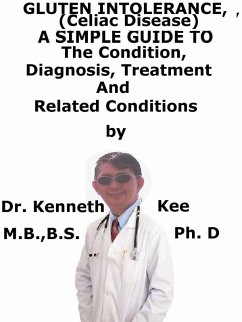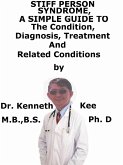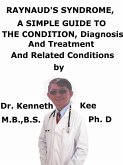The small bowel mucosa shows
1. Villous atrophy
2. Columnal to cuboidal alterations in the absorbing cells
3. Invasion of lamina propia with lymphocytes and plasma cells
Gluten is a protein found in three types of cereal:
1. Wheat
2. Barley
3. Rye
Gluten is found in any food that contains the above cereals, including:
1. Pasta
2. Cakes
3. Breakfast cereals
4. Most types of bread
5. Certain types of sauces
6. Some types of ready meals
It has been suggested that an autoimmune disease is the main cause of gluten intolerance (Celiac Disease).
A protein produced by the immune system, called HLA antigen may be a possible cause of the body's reaction in the lining of the small intestinal tract resulting in inflammation.
Gluten intolerance is an autoimmune digestive disease that injures the villi of the mucosa of small intestine and affects the absorption of nutrients from food.
The antibodies in the body are attacking the intestinal lining every time a person with gluten intolerance consumes gluten.
Celiac disease, also known as gluten intolerance, has been known as genetic disorder that affects at least 0.8% Americans.
Gluten intolerance is what is known as an autoimmune condition.
This is where the immune system (the body's defense against infection) mistakenly attacks healthy tissue.
Gluten intolerance is not an allergy or intolerance to gluten.
In cases of gluten intolerance, the immune system mistakes substances found inside gluten as a threat to the body and fight them.
This injures the surface of the intestines (small bowel), affecting the body's ability to absorb nutrients from food.
About 95% of people with gluten intolerance have the HLA-DQ2 gene and most of the remaining 5% have the HLA-DQ8 gene.
Genetic testing can determine if the patient has one or both of these genes.
It is important to note that having the gene means the patient is at risk for developing gluten intolerance, but does not mean that the patient definitely has the disorder.
The positive genetic test should be evaluated with a gluten intolerance blood panel to determine if the patient has gluten intolerance
Symptoms of gluten intolerance can range from the classic features, such as weight loss, diarrhea, and malnutrition, to hidden symptoms such as isolated nutrient deficiencies with no gastrointestinal symptoms.
Diagnosis of Gluten intolerance is made on the basis of:
1. A history of abdominal pain, diarrhea and weight loss
2. Small bowels radiology
3. D-xylose absorption study
4. Fecal fat assessment
5. Duodenal biopsy
Antibody testing, especially immunoglobulin A anti-tissue transglutaminase antibody (IgA TTG), is the best first test for suspected gluten intolerance, even though confirmation is done by examining the biopsies
In children younger than 2 years, the IgA TTG test should be combined with testing for IgG-deamidated gliadin peptides.
The primary treatment of gluten intolerance is dietary.
1. Confirmation of diagnosis.
2. Treatment begins.
If there is a one line treatment for Gluten intolerance, it is a gluten free diet.
TABLE OF CONTENT
Introduction
Chapter 1 Gluten Intolerance
Chapter 2 Causes
Chapter 3 Symptoms
Chapter 4 Diagnosis
Chapter 5 Treatment
Chapter 6 Prognosis
Chapter 7 Lactose Intolerance
Chapter 8 Food Allergy
Epilogue
Dieser Download kann aus rechtlichen Gründen nur mit Rechnungsadresse in A, B, CY, CZ, D, DK, EW, E, FIN, F, GR, H, IRL, I, LT, L, LR, M, NL, PL, P, R, S, SLO, SK ausgeliefert werden.









